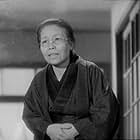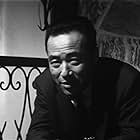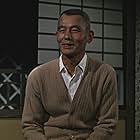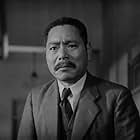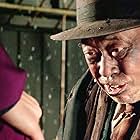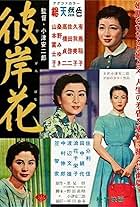Nagaya shinshiroku
- 1947
- 1h 12m
IMDb RATING
7.7/10
2.4K
YOUR RATING
In postwar Japan, an abandoned boy nobody wants to take care of grows a relationship with a cynical middle-aged woman.In postwar Japan, an abandoned boy nobody wants to take care of grows a relationship with a cynical middle-aged woman.In postwar Japan, an abandoned boy nobody wants to take care of grows a relationship with a cynical middle-aged woman.
- Director
- Writers
- All cast & crew
- Production, box office & more at IMDbPro
Storyline
Did you know
- TriviaThis was the first movie made by director Yasujirô Ozu after returning to Japan from his wartime army service abroad. After the surrender, he had been held for half a year in a British POW camp near Singapore, where he had been stationed. Legend has it that he was late in returning to Japan (in February 1946) because, although he was scheduled to be repatriated earlier, another Japanese soldier was desperate to go home, and Ozu let this other man go in his place.
- Quotes
Tamekichi: [curious about Tashiro's work, which involves fortunetelling] Does fortunetelling work?
Tashiro: Of course it does. Nothing works better.
Tamekichi: Really? The other day you left home wearing rain boots, but the day turned out to be sunny.
Tashiro: Weather isn't my specialty. The weather forecast on the radio works well for that.
- ConnectionsFeatured in The Story of Film: An Odyssey: Birth of the Cinema (2011)
Featured review
Ozu's Record of a Tenement Gentleman, 1947. B/w, 72 minutes. Original title "Nagaya Shinshiroku ~ (長屋紳士録 ).
Viewed at the Karlovy Vary Film Festival of 2003. One of the best films seen here that year was a little known Japanese film, in the Ozu retrospective sidebar entitled, "RECORD OF A TENEMENT DWELLER" made just after the war in 1947. This was Ozu's return to filmmaking for Shochiku after four years of military service in China. The film is the story of a simple unmarried woman who is forced, much against her will, to take in a small boy, apparently abandoned in the postwar shattered Tokyo hustle and bustle. After much hostility toward the child, she finally realizes how much he has filled the void in her life and that she in fact loves him -- but only does this realization hit her when the father reappears to repossess his lost child. A simple story so directly told that it sneaks up on you like a time-bomb and makes you realize that your heart was crying -- but only ten minutes after the film is over! An early masterpiece from the master of Zen and the Art of telling stories on film, and an incredibly subtle, yet bombshell, performance by the main actress Chôko Iida, in my book, a retroactive Best Actress Oscar for the year that was. Iida was extremely active in Japanese silent pictures from 1923 on and had already appeared in supporting roles in three prewar Ozu films; "An Inn in Tokyo", (1935) the first version of "Floating Weeds" (1934), and "Dekigoro" (A Passing Fancy, 1933), but this performance when she was already pushing fifty was her acting apotheosis. Unfortunately Ozu's uniquely stylized films were not discovered in the west until after his death in 1963 and are only now becoming recognized little by little in astute cinema circles as the quiet unhurried masterpieces which they are.
Viewed at the Karlovy Vary Film Festival of 2003. One of the best films seen here that year was a little known Japanese film, in the Ozu retrospective sidebar entitled, "RECORD OF A TENEMENT DWELLER" made just after the war in 1947. This was Ozu's return to filmmaking for Shochiku after four years of military service in China. The film is the story of a simple unmarried woman who is forced, much against her will, to take in a small boy, apparently abandoned in the postwar shattered Tokyo hustle and bustle. After much hostility toward the child, she finally realizes how much he has filled the void in her life and that she in fact loves him -- but only does this realization hit her when the father reappears to repossess his lost child. A simple story so directly told that it sneaks up on you like a time-bomb and makes you realize that your heart was crying -- but only ten minutes after the film is over! An early masterpiece from the master of Zen and the Art of telling stories on film, and an incredibly subtle, yet bombshell, performance by the main actress Chôko Iida, in my book, a retroactive Best Actress Oscar for the year that was. Iida was extremely active in Japanese silent pictures from 1923 on and had already appeared in supporting roles in three prewar Ozu films; "An Inn in Tokyo", (1935) the first version of "Floating Weeds" (1934), and "Dekigoro" (A Passing Fancy, 1933), but this performance when she was already pushing fifty was her acting apotheosis. Unfortunately Ozu's uniquely stylized films were not discovered in the west until after his death in 1963 and are only now becoming recognized little by little in astute cinema circles as the quiet unhurried masterpieces which they are.
- barev-85094
- Dec 29, 2015
- Permalink
- How long is Record of a Tenement Gentleman?Powered by Alexa
Details
- Release date
- Country of origin
- Language
- Also known as
- Record of a Tenement Gentleman
- Filming locations
- Tokyo, Japan(setting of the action)
- Production company
- See more company credits at IMDbPro
- Runtime1 hour 12 minutes
- Color
- Sound mix
- Aspect ratio
- 1.37 : 1
Contribute to this page
Suggest an edit or add missing content









